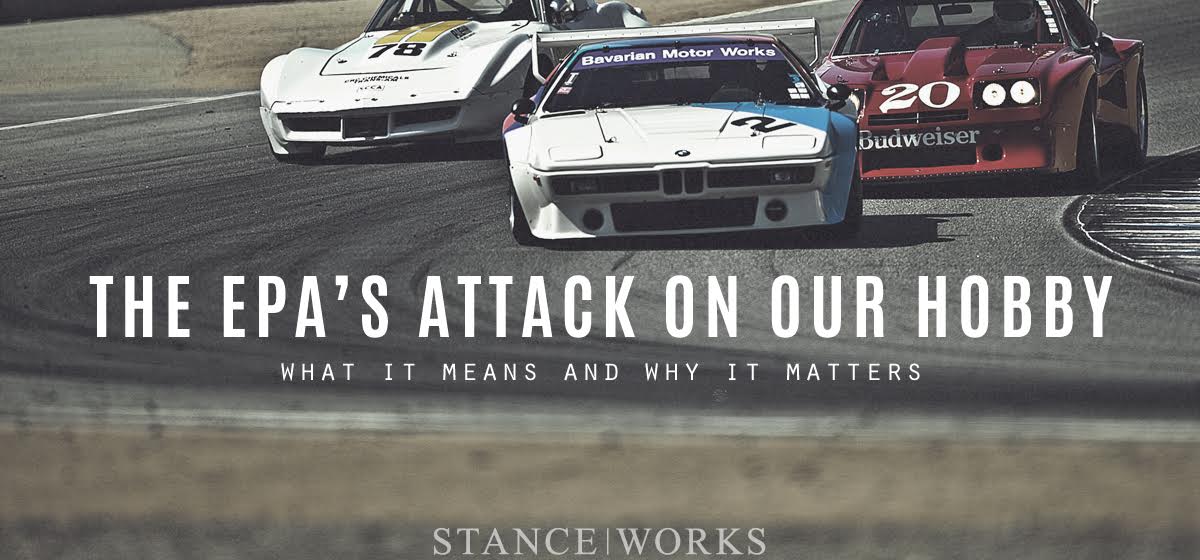Unless by some chance, you’ve managed to avoid all social media outlets for the past day or so, it’s quite likely you’ve seen the latest automotive headlines: “EPA SEEKS TO PROHIBIT CONVERSION OF VEHICLES INTO RACECARS.” It’s been everywhere, seemingly on every forum and every facebook group I’m a part of. Within hours of such news hitting the airwaves, enthusiasts from across the board have rallied; petitions have surfaced, awareness has been conjured, and it seems that a lot of people aren’t taking it lightly. Perhaps you’ve formulated an opinion on the situation already, or perhaps you’ve avoided reading it entirely. Whichever side you fall on, we urge you to read on, as we dive in and explain the EPA’s attack on automotive enthusiasts, and why you should be up in arms along with us.

It’s important to note that there’s about to be some generalizing and broad-scoping. After all, the EPA (that’s Environmental Protection Agency for those who aren’t aware) has buried its capital punishment upon us within a massive jargon-filled intentionally-complex six-hundred-and-twenty-nine-page federal document (you can read it here if you have a few days to spare). I don’t have time to cover it all, and chances are neither do you. What we can do, however, is cut to the parts that matter. First and foremost, let’s establish the issue at hand. Buried deep within their “Greenhouse Gas Emissions and Fuel Efficiency Standards for Medium- and Heavy-Duty Engines and Vehicles— Phase 2” ruling is a set of rules that goes beyond their obvious reach, and affects every car on the road… and off.

What is the EPA doing? – That’s a damn good question. With headlines like “The EPA is Cracking Down on Race Cars,” it’s easy to assume this is related specifically to racing vehicles, and perhaps that doesn’t implicate you specifically, as maybe you don’t even own a race car. Well, the problem is that it does refer to you, so here’s the issue at hand: Quoting the EPA’s federal document, “…Motor vehicles and motor vehicle engines and their emission control devices must remain in their certified configuration even if they are used solely for competition or if they become non-road vehicles or engines; anyone modifying a certified motor vehicle or motor vehicle engine for any reason is subject to the tampering and defeat device prohibitions of paragraph (a)(3) of this section and 42 U.S.C.”

SEMA, widely known in our circle for hosting the biggest event of the year in the automotive world, is also a lobbyist for the industry in which we work, live, and play. The Specialty Equipment Manufacturers Association exists specifically to help grow and protect the automotive aftermarket, and as the group to help spearhead this attack by the EPA, they’ve gone through the effort of analyzing the unbelievably long EPA document, and their analysis is this: “The EPA … regulation would prohibit conversion of vehicles into racecars and make the sale of certain emissions-related parts for use on converted vehicles illegal.”

So, why does this matter to me? – Whether you own a race car or not is surprisingly less relevant to the issue than you might initially think, and here’s why. Rewinding to the wording in the EPA document, there’s a special term the EPA uses. “….even if they are used solely for competition or if they become non-road vehicles” What is “non-road?” Well, thankfully, the EPA’s website tells us, and to do you one better, I’ll make it clear and concise. Even if you want to drive a fork lift around in your yard, these laws affect you too. The EPA is claiming complete control over the emissions and emissions system of every car and truck in the USA, no matter its intended purpose. Modify it, and you’re breaking federal law, even if that vehicle will never see the road. At least, that’s how it’s reading to us.

What’s the real damage of this Ruling? Let’s start at the top. This ruling affects the Clean Air Act, which, for decades, has been understood not to affect cars not meant for use on public roads. That includes everything from race cars, drift cars, and dragsters, to rock crawlers, trail rigs, and farm trucks. Now the EPA claims that’s no longer the case. The ruling also states a ban on the sale of “products used on such vehicles,” whatever that could be stretched to mean. At $36Billion, the automotive parts industry is massive, and Steve McDonald, SEMA’s VP for Government Affairs, says that the EPA’s ruling is poised to make a “meteor-sized dent” in the industry. In all, it will affect countless jobs, businesses, and and enthusiasts at every level. It will affect the world of motorsports as we know it – everything ranging from professional racing series like IMSA and NASCAR, to the folks at a grassroots level. Who knows what might happen to series like LeMons, Chump Car, Spec E30, and more. It will affect classic cars, trucks, and antiques, with no “wiggle room” given. Beyond that, things could easily get worse. The word of the law is fickle, and with a sentence like “anyone modifying a certified motor vehicle or motor vehicle engine for any reason is subject to the tampering and defeat device prohibitions of paragraph (a)(3) of this section and 42 U.S.C.”, and with a “civil penalty up to $37,500 for each engine or piece of equipment in violation,” it sounds to me like more than just our emissions systems are at stake.

In any case, here’s your summary: The EPA aims to cease the conversion of cars into race cars, and to ban the sale of parts that make it possible. This bill may sound like “no cat-less test pipes,” but its vagueness and verbosity leave it open-ended leaving much more hanging in the balance. There’s no enforcement plan outlined yet, which might sound promising; however, it only means that once the rules are in place, then they decide how they punish us.

What can I do? This question is the most important of all. First of all, there’s a petition worth signing on Change.org, and you can find it by clicking here. Next, we urge you to make your voice heard by those that need to hear it. Contact your local congressman or woman, and let them know what you think. By clicking this link to the House of Representatives site, you can easily look up your local congressman, and make contact with their office. Remember, if we don’t speak up, we can’t be heard. Take a few minutes and make a phone call, and let your local representative know that you simply can’t stand for it. Your passion, hobby, and perhaps job could be at stake. Lastly, make sure everyone else hears you too. Spread the word! Share this article, or others, with your friends, family, and colleagues. Let’s keep the EPA from overstepping their bounds.





